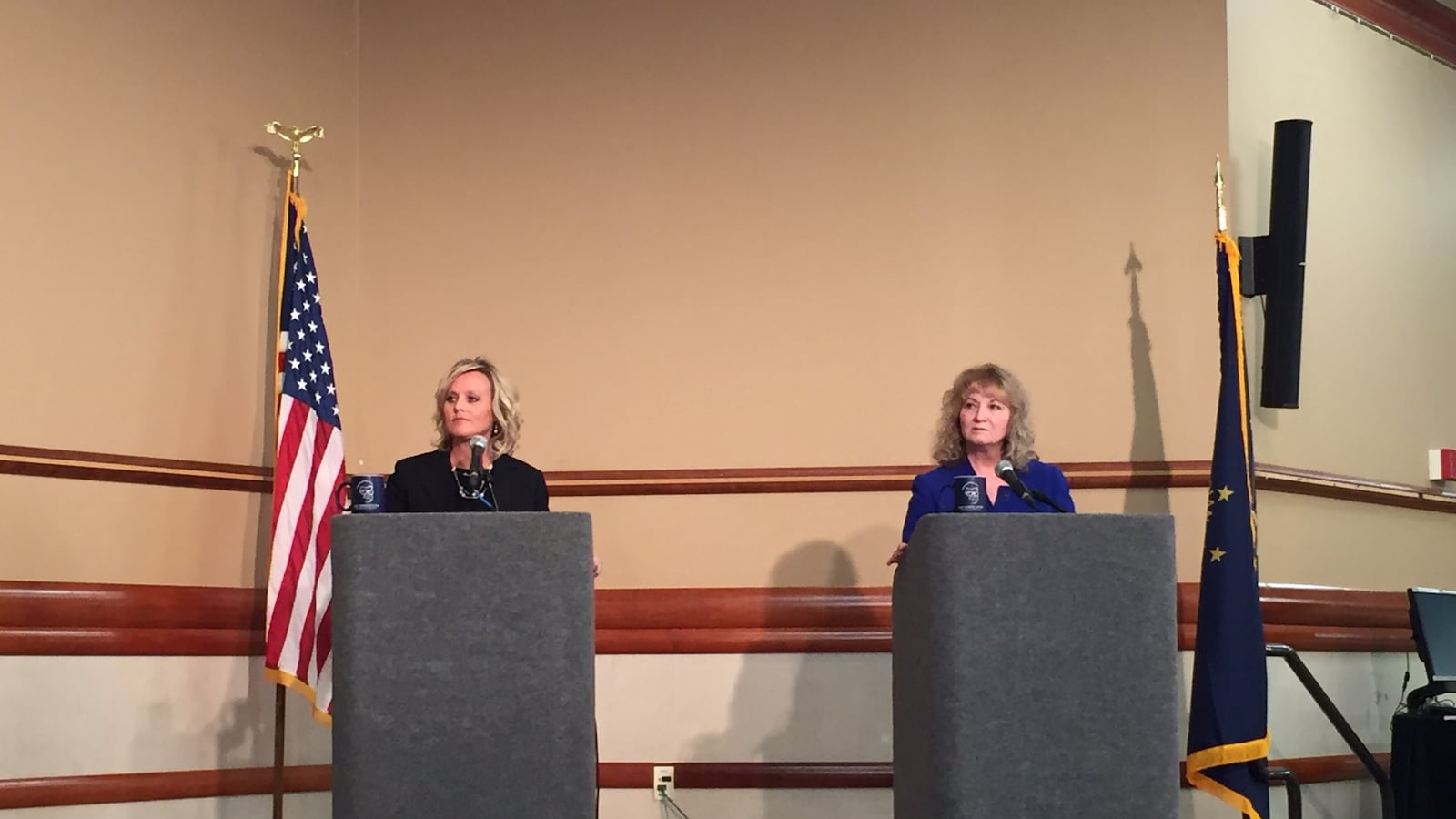With just weeks before Hoosiers will be asked to elect the next Indiana schools chief, Republican candidate Jennifer McCormick is trying hard to distinguish herself.
But now, her objective appears to not only be convincing voters that she is different from her opponent, incumbent Democrat Glenda Ritz, but that she represents a break from the divisive Republican whom Ritz unseated in 2012 with strong grassroots support from teachers who opposed many of his major initiatives, such as expanding charter schools and taxpayer-funded vouchers for private school tuition.
“I am not Tony Bennett,” McCormick said at today’s debate in Fort Wayne. “I stand on my own proven leadership.”

During her campaign, critics of school choice measures like charters and vouchers have repeatedly accused McCormick of having the same education goals as Bennett. It doesn’t help that groups that fueled Bennett’s rise have donated heavily to her campaign.
But the Yorktown superintendent has had mixed success convincing die-hard Bennett critics that she’s not like him, despite holding policy positions that are more like Ritz’s than like Bennett’s on several major education issues.
The similarities between McCormick and Ritz deepened during the debate as they offered more detail about their visions for school A-F accountability grades, preschool and some aspects of state testing.
Both candidates agree that school A-F grades should be used in tandem with other information about student progress, not just on their own to label or punish schools and districts. Ritz said she is already working to update the system at the state level to make this a reality, and McCormick said she supports using new federal law to make that happen.
“I welcome that,” McCormick said. “One grade does not tell the story of a building. One grade does not tell the story of a district. It has to be multifaceted.”
Read: Both candidates for superintendent agree A-F grades for schools are too harsh
They also support voluntary universal preschool by 2020, although their process for getting there is a bit different. While Ritz would roll out the concept more quickly with a goal of providing 25 percent of Indiana 4-year-olds with access in the first year, McCormick would begin by focusing on expanding the state’s existing pilot program, which targets children from poor families.
Ritz said just focusing on poor children isn’t enough when so many children don’t have high quality preschool as an option, regardless of income.
“We cannot afford a program where students are going to be winners and losers,” Ritz said.
Read: Ritz and McCormick agree on Indiana’s need for more preschool — not on how much to spend
One major difference between Ritz and McCormick is their stance on what Indiana should do to change its state ISTEP test. While they differ in their preferred structure, both said today that they supported getting rid of the state’s separate third-grade reading test if those skills could be measured in another way — something McCormick has not specified until now.
Read: State superintendent candidates want to kill ISTEP but differ on what should come next
But at the same time, McCormick is working to convince voters that she would be a better manager than Ritz, who she says lacks leadership.
The focus of McCormick’s campaign has been to emphasize her administrative skills from her years as a principal and superintendent. She pointed out that Ritz’s first term included a variety of snafus with testing and federal funding — evidence, McCormick says, that she can’t handle the administrative role of state superintendent.
Yet Ritz said she’s managed to make significant improvements to Indiana education despite roadblocks thrown up by Gov. Pence and the state’s Republican super-majority legislature. She highlights that she has coordinated increased on-the-ground support to turn around struggling schools so they can improve their state ratings, as well as work she’s done to bring more respect and resources to teachers in the classroom.
“I didn’t need anyone’s permission at the statehouse to serve children,” Ritz said. “Despite the political attacks that were going on.”
During the debate, McCormick simultaneously chastised Ritz for extending political tension over education issues, but reignited it by distancing herself from Bennett. She said if she’s elected, those tensions would end — although it’s hard to know if lawmakers will be more cooperative with her given the differences in some of their policy positions and the political nature of the job.
“It’s very frustrating to listen to, once again, that it’s political issues,” McCormick said. “That’s the problem. Eight years of political issues have to stop.”
The debate will be broadcast in Indianapolis on WFYI 90.1 Public Radio at 8 p.m. tonight and on WFYI 1 Television at 7 p.m. Sunday.

